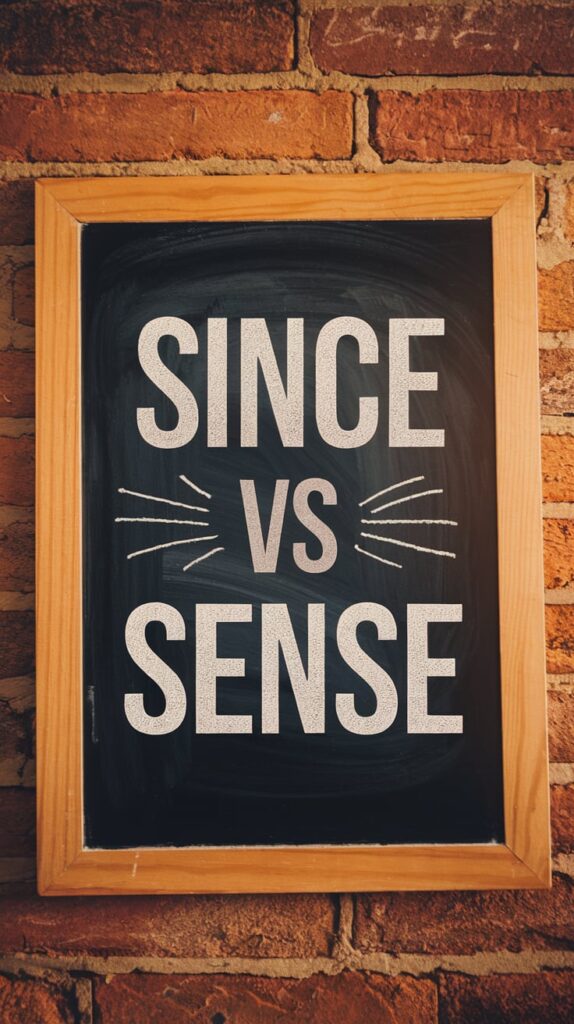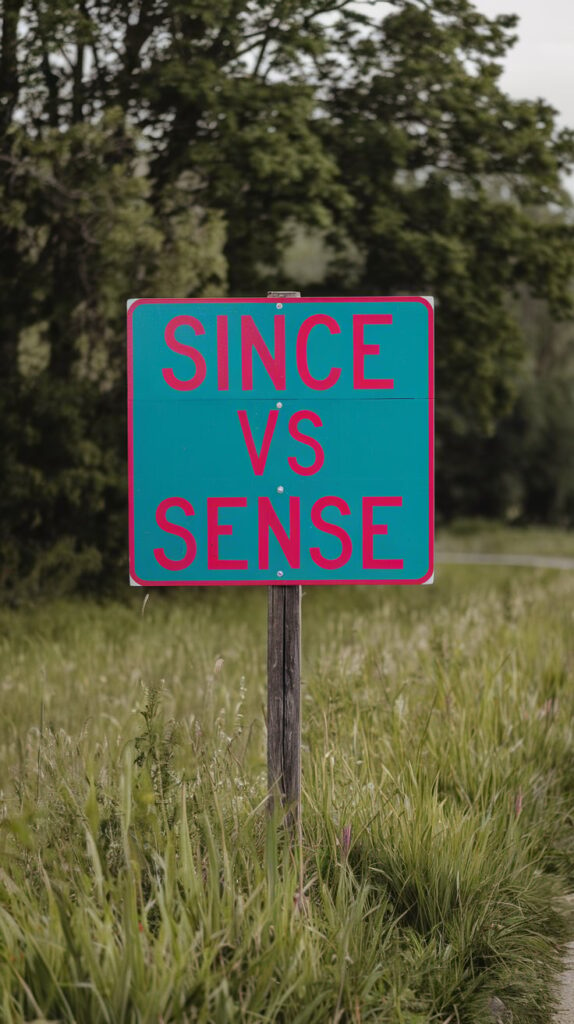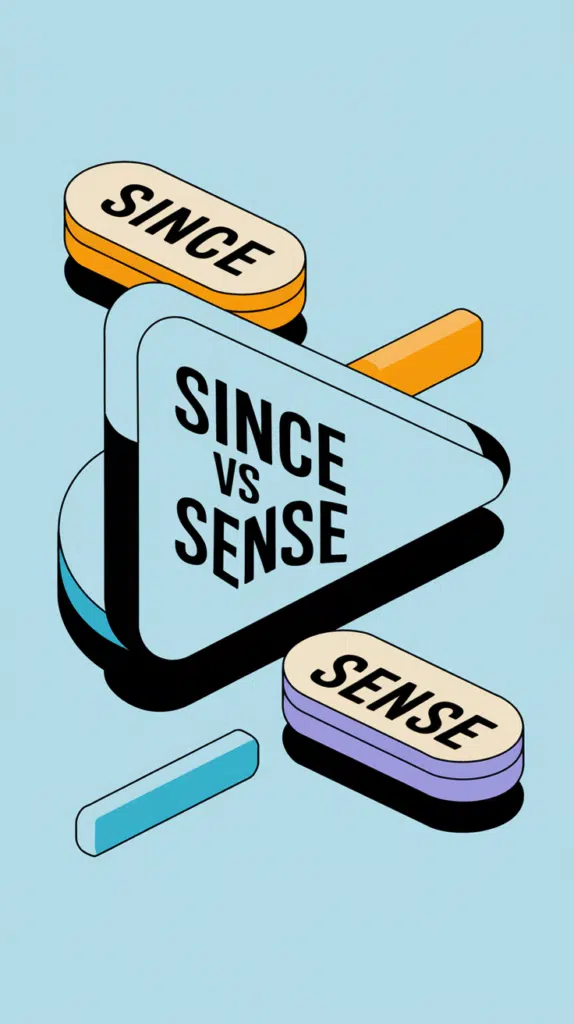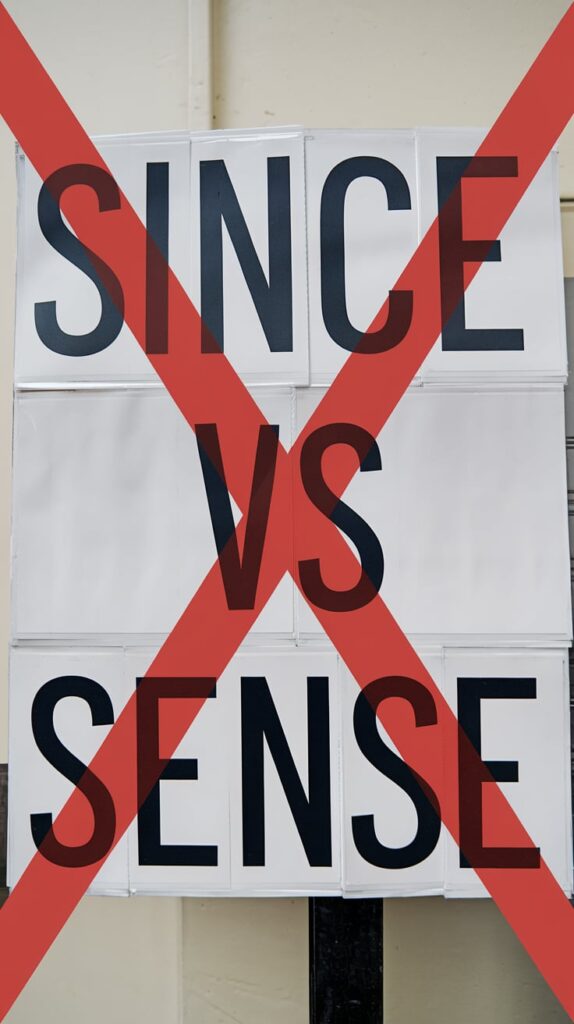Navigating the nuances of the English language can sometimes feel like walking through a maze. One of the most common areas of confusion involves the words “since” vs “sense.”
Despite their similar sounds, these words serve different functions in our sentences. This article aims to provide a comprehensive understanding of “since” and “sense,” exploring their definitions, uses, and examples that illustrate how to use each correctly.
Defining “Since” vs “Sense”
To clear the air, let’s first define each word.
Since
“Since” can function as a conjunction, preposition, or adverb. It often relates to time or cause, allowing you to indicate when something happened or the reason behind an action.
Sense
“Sense,” on the other hand, primarily operates as a noun or a verb. It often relates to perception, feeling, or understanding. Understanding how each word functions in different contexts will help you use them correctly.
Read more : Mouses vs Mice: What’s the Correct Plural of Mouse? – Grammar Beacon

Since: Understanding Its Uses
As a Conjunction
When you use “since” as a conjunction, you’re usually referring to a time or a reason.
Example: “Since it was raining, we stayed indoors.” In this sentence, “since” provides the reason for staying inside.
As a Preposition
As a preposition, “since” refers to a specific point in time.
Example: “I have lived here since 2010.” This usage marks the beginning of an ongoing situation, indicating that the speaker has been living in that place from 2010 to now.
Read more : Acclimate vs Acclimatize vs Acclimatise: Pick the Right Verb – Grammar Beacon
As an Adverb
When functioning as an adverb, “since” indicates a time frame.
Example: “I haven’t seen her since last summer.” This shows the duration from a past event to the present, emphasizing the time gap between the last encounter and the present moment.
Sense: Understanding Its Uses
As a Noun
When you use “sense” as a noun, it often refers to the physical senses (like sight, smell, and touch) or to a feeling or understanding.
Example: “She has a good sense of humor.” This highlights a characteristic related to perception and enjoyment.

As a Verb
As a verb, “sense” means to perceive or become aware of something.
Example: “He can sense the tension in the room.” This indicates an ability to feel or notice something beyond the obvious.
“Since” vs “Sense”
“Since” as a Time Traveler (or Reason Giver)
Imagine you’re telling a story. You might say, “Since I graduated, I’ve been working full-time.” Here, “since” acts as a time marker, helping the listener understand your timeline. It gives context to your current situation based on a past event.
Read more : What’s the Plural of Software? Is it Software or Softwares? – Grammar Beacon
“Sense” as Your Internal Compass
Conversely, if you’re reflecting on an experience, you might say, “I can sense that something isn’t right.” In this case, “sense” points to an instinct or intuition guiding you.
It connects to your feelings and perceptions, acting as a compass in navigating situations.
Putting It into Practice: Makes Sense or Since?
Deciding between “makes sense” and “since” can change the meaning of your sentence.
Example: “It makes sense to leave early” emphasizes understanding, while “Since we’re leaving early, let’s grab coffee” provides a reason for getting coffee.
Examples in Context
To further clarify these words, let’s dive into some specific contexts where confusion might arise.
Read more : Pre vs Post: Which Prefix to Use? – Grammar Beacon
Since (Time and Reason)
- Time: “I’ve known her since college.” This indicates the starting point of the relationship.
- Reason: “Since you’re here, can you help me?” Here, “since” gives a reason for asking for help.
Sense (Understandings and Feelings)
- Understanding: “Do you have any sense of what’s happening?” This question seeks insight into someone’s perception of a situation.
- Feeling: “I can sense his excitement about the project.” This indicates an emotional awareness.
Words You Can Use in Place of “Since” and “Sense”
Since
When Indicating Time:
- From: “I’ve been living here from 2010.”
- As of: “As of now, I have completed the project.”
- After: “I’ll call you after I finish my work.”
When Indicating Reason:
- Because: “I stayed home because it was raining.”
- As: “As it was late, we decided to leave.”
- Given that: “Given that it was a holiday, the store was closed.”
Sense
When Referring to Perception or Feeling:
- Awareness: “She has a strong awareness of her surroundings.”
- Perception: “His perception of the situation was different.”
- Intuition: “I trust my intuition in matters like these.”
When Referring to Meaning or Understanding:
- Understanding: “I have a clear understanding of the topic now.”
- Insight: “Her insight into the problem helped us find a solution.”
- Grasp: “Do you have a firm grasp of the concept?”
Origins of “Since” and “Sense”
The word “since” originates from Old English “sīþðan,” which meant “after that.” This historical background emphasizes its role in indicating time and causation.
Meanwhile, “sense” comes from Latin “sensus,” meaning “feeling” or “perception.” Understanding their roots can help you remember their uses and how they evolved over time.
Read more : Requester or Requestor Spelling – Grammar Beacon

Common Scenarios That Illustrate Confusion
Let’s explore some common scenarios where people often mix up “since” and “sense.”
Scenario 1: Discussing Events
Imagine you’re chatting with a friend about a concert.
- Correct: “I’ve loved this band since I was a teenager.” (Indicating time)
- Incorrect: “I’ve loved this band sense I was a teenager.” (Incorrect usage)
In this context, “since” correctly highlights the starting point of your admiration for the band.
Scenario 2: Feeling an Atmosphere
Picture a meeting where tensions run high.
- Correct: “I can sense that everyone is nervous.” (Referring to perception)
- Incorrect: “I can since that everyone is nervous.” (Incorrect usage)
Here, “sense” effectively communicates your perception of the atmosphere.
Scenario 3: Providing Reasons
During a discussion about a delay, you might say:
- Correct: “Since the traffic was heavy, I arrived late.” (Indicating reason)
- Incorrect: “Sense the traffic was heavy, I arrived late.” (Incorrect usage)
In this example, “since” provides a clear reason for your tardiness.

Practicing the Difference: Exercises
To reinforce your understanding, let’s try a few exercises. Fill in the blanks with either “since” vs “sense.”
- I haven’t spoken to her _ last week.
- He has a good _ of humor.
- _ we are all here, let’s start the meeting.
- I can _ that something is off today.
Answers:
- since
- sense
- Since
- sense
Common Mistakes and How to Avoid Them
While practicing, it’s essential to be aware of common mistakes people make with these words.
Misusing “Since”
- Mistake: Using “since” when the context calls for “sense.”
- Example: “I can’t believe it makes since to do it this way.”
- Correction: “I can’t believe it makes sense to do it this way.”
Misusing “Sense”
- Mistake: Using “sense” when “since” is appropriate.
- Example: “I haven’t seen her sense last month.”
- Correction: “I haven’t seen her since last month.”
By being mindful of these mistakes, you can enhance your clarity and communication skills.
Real-Life Applications of “Since” and “Sense”
Understanding how to use “since” and “sense” correctly is crucial in various contexts, including writing, speaking, and everyday conversations.
In Writing
When writing essays, articles, or emails, using the correct term can affect clarity and professionalism. For example:
- Incorrect: “The report was submitted late sense there was a misunderstanding.”
- Correct: “The report was submitted late since there was a misunderstanding.”
Using “since” accurately clarifies the reason for the delay.
In Conversations
During discussions or presentations, clarity is vital. Incorrect usage can lead to misunderstandings.
Incorrect: “It doesn’t make any
since to continue this project.”
Correct: “It doesn’t make any sense to continue this project.”
Here, using “sense” correctly conveys confusion about the project’s viability.
In Professional Settings
In meetings or business correspondence, clear communication fosters understanding and collaboration. For instance:
- Incorrect: “I’ll follow up with you since our last meeting.”
- Correct: “I’ll follow up with you since our last meeting.”
Using “since” effectively indicates the time frame of the follow-up.
Cultural Differences in Usage
Language can vary significantly across cultures, and the use of “since” vs “sense” is no exception.
American English vs. British English
In American English, the distinction between these words is often clear. However, in some British dialects, you may hear phrases that can confuse non-native speakers. It’s essential to be aware of these variations to avoid misunderstandings.
Non-Native Speakers
For non-native speakers, mastering “since” and “sense” can be challenging. Providing examples and practicing in context can help reinforce their understanding.
Encouraging them to use these words in conversations can build confidence and improve their grasp of the language.
Tips for Mastering “Since” and “Sense”
Here are some practical tips to help you master the use of “since” and “sense.”
Practice in Context: Use these words in sentences related to your daily life. The more you practice, the more natural it will become.
Read Aloud: Reading your writing aloud can help you catch any errors or awkward phrases, making it easier to spot misuse.
Engage in Conversations: Discuss topics that interest you with friends or colleagues, consciously using “since” and “sense.”
Use Visual Aids: Creating flashcards with examples of both words can help reinforce their meanings and uses.
Seek Feedback: If you’re unsure about your usage, ask a friend or mentor to review your writing and provide constructive feedback.

Conclusion
In conclusion, mastering the difference between “since” vs “sense” can significantly enhance your writing and communication skills. Remember, “since” relates to time and reasons, while “sense” deals with perception and understanding.
By keeping these distinctions in mind, you’ll navigate these terms with confidence, ensuring clarity in your conversations and writing.
Understanding the nuances of these words is essential for effective communication. The next time you find yourself reaching for either “since” vs “sense,” take a moment to consider the context.
With practice, you’ll become proficient in using both terms correctly.
Sources

James Logan is a seasoned blogger and language enthusiast behind Grammar Beacon. With years of experience in grammar and writing, James shares his expertise through insightful and engaging content. His passion for clear communication and linguistic precision shines in every post, making complex grammar concepts accessible and enjoyable for readers. Follow James for expert advice and tips to refine your writing skills.






